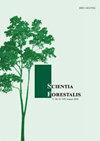巴西杜尼桉树林分不同面积的比例概率抽样方法
IF 0.4
4区 农林科学
Q4 FORESTRY
引用次数: 0
摘要
巴西的许多森林公司开始在其连续森林调查(CFI)中使用不同大小的样地,主要是为了避免边缘树木的影响,并在CFI中获得更一致的估计。因此,在采用与可变平均面积成概率比例选择树木的抽样方法与采用与固定面积成概率比例选择树木的方法之间进行比较是非常重要的。在本研究中,开发了抽样方法的理论,其中在地块中选择一组树木的概率与地块中每60棵树木的可变平均占用面积(PPVA)成正比。该数据由巴西圣卡塔琳娜州桉树少女森林清查中的41个永久样地组成。为了将PPVA方法与传统的固定面积法(PPA)进行比较,使用无人机(UAV)对该区域进行成像,从而获得活树的完整列表(普查)。对于这部分,还测量了PPVA法和PPA法的7个地块,以便将普查中获得的总体积与PPVA和PPA结果进行比较。与PPVA法相比,获得的作为人口普查函数的地块总面积在99%概率水平上没有显著差异,而固定面积法在95%概率水平上存在统计学差异,导致高估比人口普查结果高出7.5%。PPAV采样方法以较低的成本为森林种群特征提供参数估计;它比固定区域样地采样更有效,因为它们在实地划分时更实用,操作上也更容易,为种群中每棵树(m2)提供适当的估计和更准确的平均职业面积。本文章由计算机程序翻译,如有差异,请以英文原文为准。
Sampling method with proportional probability to variable areas in stands of Eucalyptus dunnii Maiden in Brazil
Many forest companies in Brazil started using plots of varying sizes in their continuous forest inventories (CFI), mainly to avoid the effects of marginal trees and to obtain more consistent estimates in the CFI. Consequently it was quite important to present a comparison between the results of applying a sampling method in which trees are selected with probability proportional to a variable average area with the method in which the trees are selected with probability proportional to a fixed area plot. In this study, the theory for a sampling method was developed, in which a selection of a group of trees in a plot is done with probability proportional to a variable average area of occupation (PPVA) per 60 trees in a plot. The data is composed by 41 permanent plots from a forest inventory of Eucalyptus dunnii Maiden in Santa Catarina, Brazil. In order to compare the PPVA method with the traditional fixed area method (PPA), the area was imaged with an unmanned aerial vehicle (UAV), allowing to obtain a full list of living trees (census). For this fraction, 7 plots for PPVA method and 7 for the PPA method were also measured, allowing the comparison of the total volume obtained in the census with PPVA and PPA results. The total volume of the plot obtained as a function of the census, when compared to the PPVA method, did not present significant differences at the 99% probability level, while the fixed area method was statistically different at the 95% probability level, resulting in an overestimation of 7.5% higher than that found in the census. The PPAV sampling method provides parameter estimates for characterization of the forest population at a lower cost; it becomes more effective than sampling with fixed area plots, because they are practical and operationally easy for delimitation in the field, providing appropriate estimates and more accurate average occupational area for each individual tree (m2) in the population.
求助全文
通过发布文献求助,成功后即可免费获取论文全文。
去求助
来源期刊

Scientia Forestalis
Agricultural and Biological Sciences-Forestry
CiteScore
1.00
自引率
0.00%
发文量
39
期刊介绍:
Scientia Forestalis is a scientific publication of the IPEF – Institute of Forest Research and Studies, founded in 1968, as a nonprofit institution, in agreement with the LCF – Department of Forest Sciences of the ESALQ – Luiz de Queiroz College of Agriculture of the USP – São Paulo University. Scientia Forestalis, affiliated to the ABEC – Brazilian Association of Scientific Publishers, publishes four issues per year of original papers related to the several fields of the Forest Sciences.
The Editorial Board is composed by the Editor, the Scientific Editors (evaluating the manuscript), and the Associated Editors (helping on the decision of acceptation or not of the manuscript, analyzed by the Peer-Reviewers.
 求助内容:
求助内容: 应助结果提醒方式:
应助结果提醒方式:


